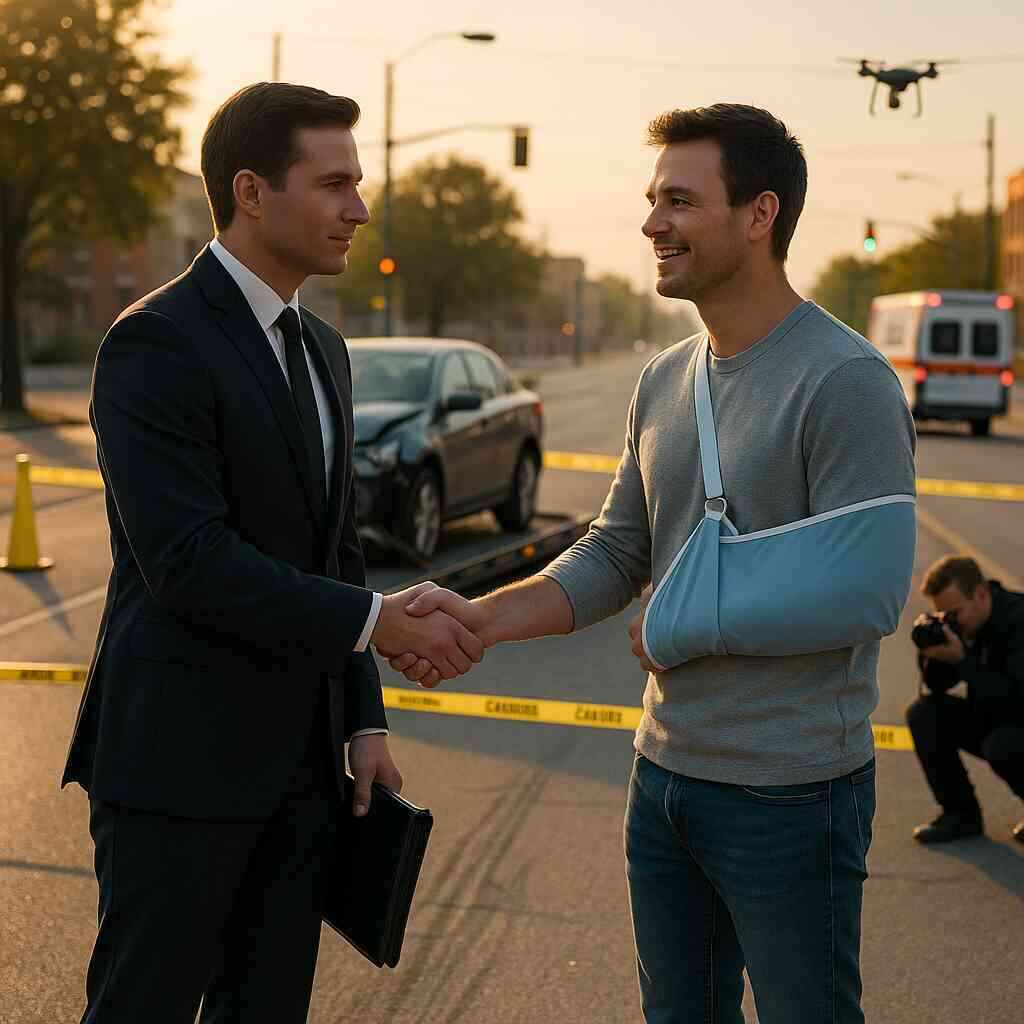 Posted On: 05/12/2025
Posted On: 05/12/2025Navigating Tomorrow: A Prelude to 2025
The Intersection of Law and Technology: Pioneering Advances
As we approach 2025, the convergence of personal injury law and technology is crafting a new frontier. Legal professionals are increasingly embracing tools like AI and blockchain to enhance their practice, ultimately benefiting both clients and attorneys. These innovations facilitate a more efficient personal injury claims process, allowing for greater accuracy and speed in handling cases. As firms adopt technological solutions, the digital transformation in legal fields is ushering in an era where legal services become more accessible and transparent to injured persons.
Technology in law not only streamlines case management but also introduces new methods of evidence presentation. For instance, virtual reality simulations in accident reconstructions help provide more compelling narratives in court. This technological shift signifies that the future of personal injury claims is set to become more robust, precise, and innovative.
Changing Tides: How the Pandemic Reshaped Injury Claims
The COVID-19 pandemic has left a lasting impact on the legal landscape, reshaping how personal injury claims are managed and litigated. The global crisis accelerated the adoption of virtual consultations and remote hearings, offering a glimpse into a more flexible future. As courts and law firms adjust to these changes, clients benefit from the convenience and safety of accessing legal services from the comfort of their homes.
Moreover, the pandemic has emphasized the importance of robust digital infrastructure in sustaining legal operations. The shift has spurred innovative legal solutions adapted to the new normal, where remote legal assistance becomes a pivotal component in managing personal injury claims. Understanding the impact of a pandemic on injury claims is crucial as we move toward 2025, recognizing the necessity of adaptable legal strategies to cater to evolving client needs.
From Present to Future: Envisioning the Next Steps in Personal Injury
As we transition from today to tomorrow, envisioning the future of personal injury law involves embracing emerging technologies and adapting to societal shifts. Predictive analytics is beginning to play an integral role, offering lawyers and clients foresight into potential outcomes of legal proceedings. This data-driven approach enables more strategic decision-making and enhances the chances of favorable resolutions.
The future of personal injury claims isn’t just about technological advancement but also about fostering a more personalized legal experience. Enhanced client-lawyer communication, facilitated by tools like emotional AI, addresses not only the technical aspects of a case but also the emotional distress faced by injured parties. As the legal field undergoes this transformation, it’s essential to stay ahead of the curve, continuously innovating to meet and exceed client expectations in a rapidly changing world.
Digital Revolution: The New Legal Frontier
Virtual Consultations: Redefining Client-Lawyer Interactions
Virtual consultations have dramatically redefined how clients and law firms interact, especially within personal injury law. By 2025, digital communication is expected to become the primary platform for initial and ongoing consultations. This shift not only enhances accessibility but also provides a more flexible framework for managing personal injury claims, such as those involving car accidents and physical injuries.
Clients now enjoy the convenience of discussing sensitive issues like medical treatment and attorney fees from home. Understanding Settlement Processes with Law Locator Virtual platforms, including video calls and online portals, allow for seamless attorney-client engagement, ensuring effective representation despite geographical distance. The technology in law is essential in ushering this transformation, making legal assistance more reachable than ever before.
Moreover, virtual consultations facilitate smoother follow-ups, quicker document exchanges, and the ability to involve multiple parties in conferences without the logistical challenges of in-person meetings. This model is particularly advantageous for clients dealing with wrongful death claims or medical malpractice cases, where time is crucial. As availability becomes more widespread, it reshapes client expectations and standardizes superior legal services across the board.
AI Integration: Streamlining Legal Processes in Personal Injury
Artificial intelligence is becoming indispensable in streamlining legal processes associated with personal injury claims. AI tools automate routine tasks, significantly reducing the workload on personal injury lawyers and law firms and offering them more time to focus on complex elements of a case.
The use of AI enables rapid data organization and evidence evaluation, ensuring a more efficient and less error-prone process. Furthermore, AI in legal systems aids in managing vast amounts of historical data to predict outcomes and tailor legal strategies effectively. This approach transforms the way personal injury attorneys strategize about personal injuries resulting from motor vehicle accidents, medical professionals’ negligence, or workplace injuries.
By integrating AI, firms can offer more personalized services to clients as the technology handles monotonous tasks. As AI continues to evolve, it assures greater transparency and precision in the claims process, impacting how law firms deliver their services. This advancement not only optimizes legal operations but also aligns with the evolving expectations of clients accustomed to technological efficiencies in everyday life.
Predictive Analytics: Foreseeing Legal Outcomes with Precision
Predictive analytics is quickly becoming a critical component in personal injury law, promising unparalleled insights into potential case outcomes. Guide to the Personal Injury Process with Law Locator. By analyzing past legal precedents and current case specifics, legal teams can forecast the likelihood of success with greater precision. This tool is especially invaluable in complex civil cases, offering clients and attorneys a clearer vision of potential verdicts and settlement amounts.
Implementing predictive analytics allows attorneys to develop data-driven strategies, which is crucial when dealing with insurance companies aiming to minimize payouts for claims related to property damage or physical injuries. Furthermore, it empowers personal injury lawyers to present stronger, evidence-backed arguments; this methodological advancement supports clients in making better-informed decisions about their injury attorney near them and their approach to litigation.
As the industry becomes increasingly reliant on data, predictive analytics stands as a transformative force in crafting legal approaches, shaping the future of personal injury law to be more informed and strategic. Harnessing this technology ensures clients benefit from a forward-facing legal service that anticipates changes and responds effectively to evolving legal challenges.
Blockchain and Smart Contracts: Transforming Personal Injury Claims
Blockchain technology and smart contracts are poised to revolutionize how personal injury claims are processed. Their integration signifies a new era of transparency, security, and efficiency across the legal landscape. Blockchain’s immutable nature ensures that all transactions and documents related to a claim are securely recorded and accessible, fostering trust between injured parties and insurance companies.
Smart contracts automate and enforce the terms of a personal injury claim once conditions are met, eliminating the need for intermediaries and reducing the potential for disputes. This is particularly beneficial in cases involving complex settlements or intricate legal arrangements. The role of blockchain in personal injury claims extends beyond transactional efficiency, promoting cost-effectiveness by streamlining administrative processes.
The adoption of blockchain and smart contracts can significantly decrease the time required to resolve claims, benefiting clients facing urgent medical bills or property damage costs. By 2025, these technologies are expected to be integral to personal injury law, setting new standards for how legal agreements are managed and executed.
State-Specific Evolutions: A Nationwide Perspective

Legislative Overhaul: Adapting to Evolving State Laws
The continually evolving landscape of state-specific laws significantly impacts personal injury claims. By 2025, we foresee considerable legislative overhauls across various states, reflecting a dynamic legal atmosphere. This transformation necessitates that personal injury attorneys stay abreast of developments, ensuring they effectively navigate these changes to benefit their clients. As states implement new regulations, understanding the nuances of these laws becomes crucial. Whether seeking a personal injury lawyer in California or New York, clients demand an attorney who is well-versed in these complex shifts.
Moreover, state-specific legal changes influence how personal injury claims are processed, requiring attorneys to adopt adaptive litigation strategies. States like Texas and Florida may alter legal procedures to reinforce consumer protections, affecting how cases of car accidents and workplace injuries are handled. By understanding these legislative overhauls, Personal Injury Law Locator ensures clients choose law firms that adeptly maneuver these challenges, providing peace of mind during legal processes.
Insurance Industry Innovations: Bridging the Gap
Rapid advancements within the insurance industry are reshaping the personal injury claims environment. By integrating cutting-edge technology and novel policies, insurance companies are revolutionizing how claims are processed and settlements reached. Innovators within the field recognize the necessity of addressing policyholders’ evolving needs, thereby enhancing customer satisfaction and elevating service delivery.
These insurance industry innovations offer unprecedented opportunities to streamline claims processes by employing automated systems that minimize human error while expediting approvals. Embracing digital platforms leads to a more transparent interaction between parties, which is crucial in resolving disputes arising from property damage or personal injuries. As this trend matures, clients will experience a smoother transition from filing claims to receiving compensation, bridging the gap that once hindered swift resolutions.
Adaptive Legal Strategies: Tailoring Approaches for State-specific Challenges
Crafting adaptive legal strategies tailored to individual state challenges is an essential competency for modern law firms. What Personal Injury Victims Must Know: Law Locator Edition. Recognizing the diverse legal frameworks across the United States enables attorneys to customize their approaches, providing clients with the best possible outcomes regardless of their location. Whether dealing with a personal injury lawyer in Ohio or Georgia, understanding the peculiarities of each state’s laws is indispensable.
Personal Injury Law Locator prides itself on connecting clients with attorneys who are proficient in state-specific legal practices. By maintaining a robust network of legal professionals, we ensure effective representation in nuanced cases involving workplace injuries or wrongful death. Attorneys leveraging their expertise to address local legislative changes offer an edge in achieving favorable outcomes. This approach empowers clients, affirming that despite geographical differences, they receive consistent and exemplary legal support.
Understanding and adapting to state-specific legal environments and insurance innovations is imperative for future-ready legal representation. By 2025, distinguishing these competencies will be pivotal for navigating complex personal injury cases successfully.
Connecting People and Practices: A Vision for Personalized Law
Enhancing Client-Lawyer Communication: A Personalized Touch
In the rapidly evolving world of personal injury law, enhancing client-lawyer communication emerges as a cornerstone of personalized legal services. By 2025, fostering effective communication will be crucial in cultivating relationships built on trust and understanding. Digital tools streamline conversations between injured parties and legal professionals, ensuring clarity and accuracy throughout the claims process. Firms prioritize enhanced client communication, reducing the complexity often associated with legal procedures. As these practices gain momentum, legal teams become more attuned to the nuances of each case, offering empathetic and customized solutions for physical injuries and emotional distress endured by clients.
Heightened communication is not limited to verbal exchanges; it extends to document sharing and case updates in real-time. Advanced Insights for Winning Injury Cases Near You. Clients benefit from this transparency, as it empowers them with knowledge and insight into their legal journey. By integrating advanced communication technologies, such as secure portals and messaging systems, legal professionals enhance their practice. This commitment to personalized interaction supports clients in navigating the intricacies of insurance claims and civil lawsuits, streamlining their path to justice.
Remote Legal Assistance: Bridging Distance Gaps
Remote legal assistance stands as a transformative force in bridging distance gaps, ensuring access to legal representation regardless of geographical constraints. By capitalizing on technological advancements, personal injury lawyers can efficiently assist clients across different states and regions. This shift towards virtual legal assistance represents a significant development in making legal services more inclusive and accessible. Remote consultations facilitate timely legal advice, meeting the demand for immediate support from injured individuals experiencing medical treatment or dealing with property damage.
As legal professionals adapt to remote practices, they leverage digital tools to deliver seamless, high-quality services that transcend physical boundaries. Virtual conferences, e-signatures, and cloud-based document management enhance the remote legal experience, providing clients with convenient and efficient legal guidance. Embracing remote legal assistance allows individuals to connect with skilled attorneys from the comfort of their home, reinforcing the principle that no matter where they reside, they have access to proficient legal support tailored to their specific needs.
Emotional AI: Addressing Emotional Distress in Personal Injury
Emotional AI represents an innovative frontier in addressing the emotional distress inherent in personal injury cases. By incorporating AI-driven tools that recognize and respond to clients’ emotional states, legal professionals can offer a more supportive and empathetic approach. These technologies evaluate emotional cues, enabling lawyers to adjust their communication strategies effectively. Recognizing the added layer of emotional complexity in cases involving wrongful death or medical malpractice is critical to achieving favorable client outcomes.
The integration of emotional AI in cases enhances the legal team’s ability to empathize with clients, addressing their emotional and psychological needs alongside legal requirements. As this technology advances, it provides clients with a more holistic legal experience, catering to both their legal aspirations and emotional well-being. By 2025, emotional AI is expected to become an integral aspect of personal injury law, driving a more compassionate approach that underscores the importance of emotional intelligence in legal practice.
Conclusion: The Path Ahead for Personal Injury Law
Sustainable Legal Practices: Forging a Future-Ready Legal Field
The journey to 2025 and beyond in personal injury law hinges on sustainable legal practices that adapt to the changing landscape. Emphasizing environmentally friendly and ethically sound legal processes will set the foundation for future generations. Law firms are increasingly expected to integrate practices that reduce their carbon footprint and promote sustainability. This shift not only aligns with global environmental goals but also resonates with clients who value conscious business practices. Furthermore, adopting sustainable workflows streamlines operations and enhances client satisfaction, paving the way for a future-forward legal industry.
Leveraging Innovations: Pioneering the Legal Landscape of 2025
As technology advances, legal professionals must leverage innovations to pioneer change in personal injury law. The integration of tools like AI, blockchain, and predictive analytics will redefine traditional practices, opening new avenues for client engagement and case management. These technologies equip law firms with the resources needed to handle complex cases efficiently and effectively, offering clients superior service. Innovative solutions in the legal realm, such as smart contracts, ensure transparency and fairness, significantly impacting how state-specific legal changes are navigated. Remaining at the forefront of technological advancements will fortify the legal field’s position as a leader in client support and advocacy.
Embracing Change: The Journey Forward in Personal Injury Law
Embracing change is fundamental to evolving the landscape of personal injury law by 2025. Legal professionals must remain agile, anticipating shifts in technology, legislation, and societal needs. By fostering a culture of adaptability, law firms can deliver exceptional client experiences while navigating the complexities of evolving cases. How Does a Law Locator Transform Complex Injury Claims? This proactive attitude not only empowers lawyers to address immediate client concerns but also prepares them for future challenges. As we progress into this new era, Personal Injury Law Locator remains committed to connecting individuals with dedicated attorneys, ensuring that the journey forward is marked by innovation, compassion, and comprehensive legal support. For additional insights into the transformative power of personal injury law, consider exploring a personal injury law overview.
Frequently Asked Questions
Question: How is AI integration changing the landscape of personal injury law in 2025?
Answer: AI integration is revolutionizing personal injury law by streamlining legal processes and offering more personalized services to clients. AI tools automate routine tasks, allowing personal injury lawyers to focus on complex case elements. Exploring the Future of Injury Law with Personal Injury Law Locator. These tools enable rapid data organization and evidence evaluation, reducing errors and increasing efficiency. With AI, personal injury claims related to motor vehicle accidents or medical malpractice are managed with greater precision. Top Strategies in Medical Malpractice with Personal Injury Law Locator AI’s role ensures clients receive transparent and timely legal support, aligning with the evolving expectations of those accustomed to technological efficiencies.
Question: In what ways are virtual consultations enhancing client-lawyer interactions?
Answer: Virtual consultations are transforming client-lawyer interactions by providing a flexible platform for communication. This innovation allows clients to discuss their injury claims conveniently from home, addressing sensitive issues like medical treatment and attorney fees without geographical constraints. Video calls and online portals facilitate seamless engagement, ensuring effective legal representation. Particularly advantageous for wrongful death or medical malpractice cases, virtual consultations improve accessibility to personal injury services and standardize superior legal assistance.
Question: What role does blockchain technology play in personal injury claims, according to the blog post ‘The Future of Injury Claims: What 2025 Holds for You’?
Answer: Blockchain technology is set to revolutionize personal injury claims by ensuring transparency, security, and efficiency. Its immutable nature securely records all transactions and documents, fostering trust between parties. Smart contracts automate claim settlements, eliminating intermediaries and reducing disputes. Maximizing Settlements: A Personal Injury Law Locator Perspective. This is particularly beneficial in intricate legal arrangements, promoting cost-effectiveness and speeding up claim resolutions. As technology becomes integral by 2025, clients benefit from expedited processes to manage urgent medical bills or property damages efficiently.
Question: How do predictive analytics provide insights into legal outcomes for personal injury cases?
Answer: Predictive analytics is a game-changer in personal injury law, offering unparalleled insights into potential legal outcomes. By analyzing past precedents and specifics of current cases, legal teams can foresee success likelihoods with precision. This data-driven approach is invaluable in complex civil cases, aiding attorneys in crafting evidence-backed strategies. For clients, understanding possible verdicts or settlement amounts becomes clearer. Predictive analytics empowers clients to make informed decisions, aligning with innovative legal solutions while minimizing insurance company payouts.
Question: According to the blog content,howw has the COVID-19 pandemic reshaped personal injury claims and influenced the ‘future of injuryclaimst?
Answer: The COVID-19 pandemic reshaped personal injury claims by accelerating the adoption of virtual consultations and remote hearings. Winter 2025 Trends in Personal Injury Litigation. This shift towards digital consultations offers a glimpse into a more flexible and client-centric future. WWith a obust digital infrastructure, legal services are accessible safely from home. The pandemic highlighted the importance of innovative legal solutions and adaptability, emphasizing the need for remote legal assistance as a pivotal component in managing claims. Innovative Tactics for Navigating Personal Injury Claims. As we approach 2025, these changes signify a transformed personal injury landscape, catering to the evolving needs of injured parties.



